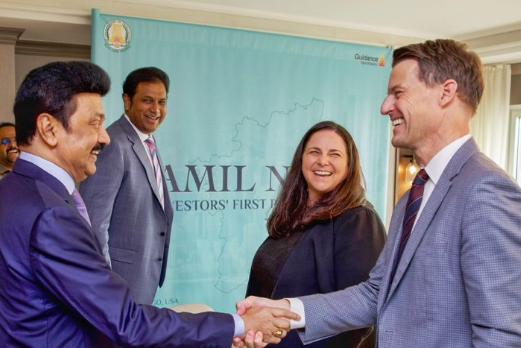Ford Motor Company, a leading American multinational automaker, has made headlines with its recent decision to restart manufacturing operations in Tamil Nadu, India. This move marks a significant shift in Ford’s strategy in the Indian market, which has seen various ups and downs over the years. The decision follows a productive dialogue between Tamil Nadu Chief Minister M.K. Stalin and Ford executives, reflecting a renewed commitment to growing the automotive sector in the region.
Historical Context
Ford’s Previous Ventures in India
Ford initially entered the Indian market in 1995, establishing a strong foothold with its popular models like the Ford Escort and the Ford Endeavour. However, the company faced challenges, including intense competition, regulatory hurdles, and fluctuating market demands.
Despite various successes, Ford decided to halt production in India in 2022, citing unsustainable business conditions.
The Shift in Strategy
Ford’s exit from the Indian market was a significant development, as it came amidst broader industry shifts and economic uncertainties.
The company’s decision to cease production was driven by various factors, including high production costs, low market share, and changing consumer preferences.
The strategy seemed to signal Ford’s withdrawal from the Indian automotive landscape.
The Re-Entry Decision
The Recent Announcement
The recent announcement that Ford will restart its manufacturing plant in Tamil Nadu is a significant development. The company plans to leverage the advantages of the state’s favorable business environment, skilled workforce, and strategic location.
This move aligns with Ford’s broader strategy to optimize its global manufacturing footprint and cater to growing demand in the Indian market.
Key Discussions with Tamil Nadu Government
Tamil Nadu Chief Minister M.K. Stalin played a crucial role in the negotiations that led to Ford’s decision. The discussions focused on creating a more favorable business environment, addressing regulatory challenges, and offering incentives to make the investment more attractive.
The state government’s proactive stance and commitment to supporting automotive industry growth were pivotal in convincing Ford to consider its comeback.

Economic and Industry Implications
Impact on the Local Economy
The reopening of Ford’s manufacturing plant is expected to have a positive impact on the local economy. It will create job opportunities, stimulate ancillary industries, and contribute to the overall economic development of Tamil Nadu.
The presence of a global automotive giant will also enhance the state’s reputation as a key player in the automotive sector.
Implications for the Automotive Industry
Ford’s re-entry into Tamil Nadu will likely influence the broader automotive industry in India. It could prompt other automakers to reconsider their strategies and investments in the region. Additionally, it may lead to increased competition, innovation, and improved consumer options in the Indian market.
Future Prospects
Ford’s Strategy Moving Forward
Ford’s strategy in India will likely involve a combination of leveraging local manufacturing capabilities and aligning with evolving market trends.
The company is expected to focus on producing models that cater to the preferences of Indian consumers and exploring new business opportunities in the region.
The Role of Government Policies
The success of Ford’s re-entry will also depend on the continued support from the Tamil Nadu government and broader policy frameworks at the national level.
Pro-business policies, investment incentives, and infrastructural improvements will play a crucial role in shaping the future of Ford’s operations in India.
Conclusion
Ford Motor Company’s decision to restart its manufacturing operations in Tamil Nadu marks a new chapter in its journey within the Indian automotive market.
The strategic move, influenced by productive discussions with Tamil Nadu’s leadership, reflects a renewed commitment to growth and development in the region.
As Ford embarks on this new phase, the implications for the local economy and the broader automotive industry will be closely watched.

I dugg some of you post as I thought they were very useful very useful
Some truly interesting information, well written and generally user genial.
I haven¦t checked in here for a while since I thought it was getting boring, but the last several posts are good quality so I guess I will add you back to my everyday bloglist. You deserve it my friend 🙂
Here those on!
https://the.hosting/
https://ping.space/
https://ufo.hosting/en/vps-vds
seychelles yacht rental
whoah this blog is wonderful i like reading your articles. Keep up the great work! You realize, many people are hunting round for this info, you can help them greatly.
Somebody essentially help to make seriously posts I would state. This is the first time I frequented your website page and thus far? I surprised with the research you made to make this particular publish amazing. Wonderful job!
https://auctionwheels.info/cars/hyundai/pagination/start
I do agree with all the ideas you have presented in your post. They’re very convincing and will definitely work. Still, the posts are too short for starters. Could you please extend them a bit from next time? Thanks for the post.
Oh my goodness! an amazing article dude. Thank you Nonetheless I’m experiencing situation with ur rss . Don’t know why Unable to subscribe to it. Is there anybody getting equivalent rss drawback? Anyone who knows kindly respond. Thnkx
certainly like your web site however you need to take a look at the spelling on several of your posts. A number of them are rife with spelling issues and I in finding it very troublesome to inform the reality on the other hand I will certainly come back again.
You have brought up a very excellent details, appreciate it for the post.
Loving the info on this site, you have done great job on the articles.
I envy your piece of work, thanks for all the interesting content.
pokie machine laws canada, gambling laws canada and uk latest online casino, or free chip no deposit united states 2021
Also visit my web site: list of non Smoking casinos